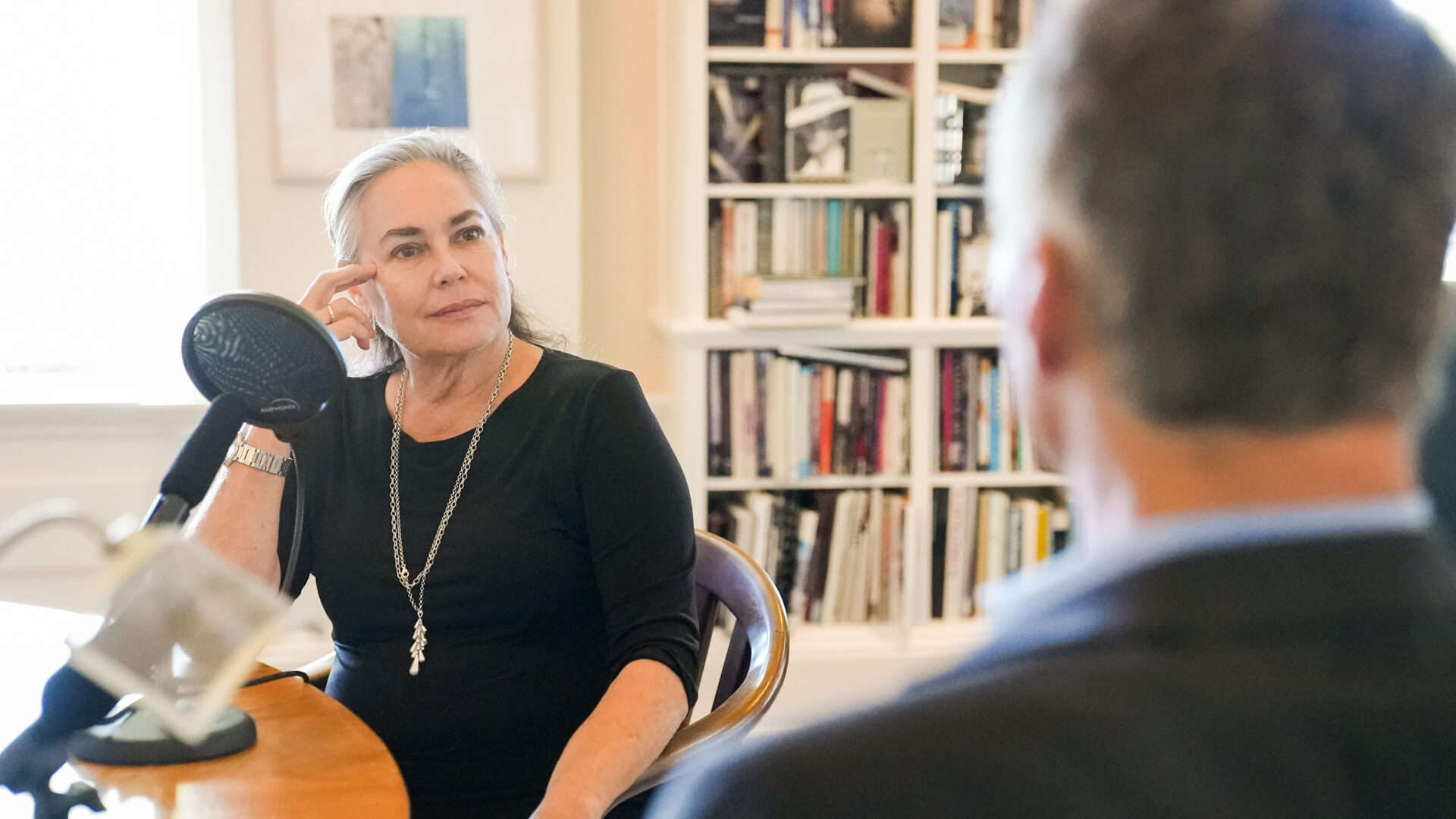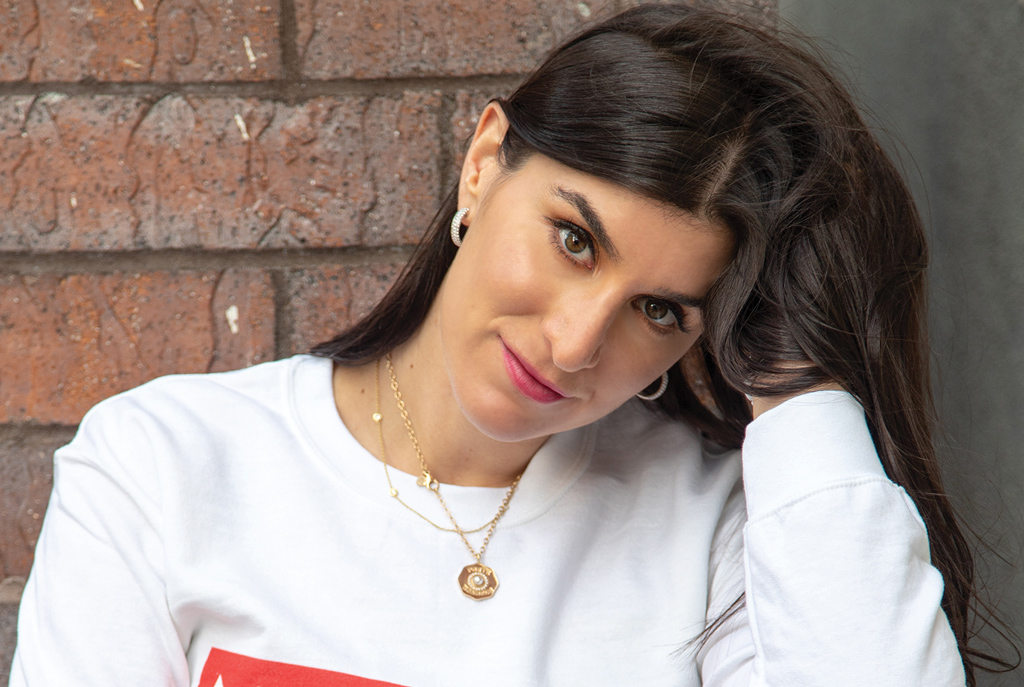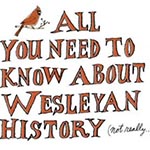In Conversation: Creative Writing at Wesleyan

Acclaimed author, Shapiro-Silverberg Professor of Creative Writing, and Director of the Shapiro Center for Writing Amy Bloom talks to President Michael S. Roth about the rhythm of writing, the elasticity of language, and creating a home for creative writing, independent of major or department, in this Wesleyan magazine audio conversation.
Established in 2009 with a gift from John Shapiro ’74 and Shonni Silverberg ’76, the Shapiro Center brings together academic, creative, and public writing at Wesleyan University. In 2022, Wesleyan launched the Shapiro-Silverberg Distinguished Writers in Residence program, which was made possible through the continued generous support of Shapiro and Silverberg.
Read a transcript of the conversation:
Michael Roth:
Welcome to Wesleyan University Magazine and our inaugural digital issue. I’m Michael Roth, President of Wesleyan University. For this issue, I’m joined by Shapiro-Silverberg Professor of Creative Writing and Director of the Shapiro Center for Writing, my friend and a great writer, someone who I just love reading and spending time with, Amy Bloom.
Amy has written multiple New York Times best-selling books, short stories, essays, television scripts, children’s books, and more. She’s been a nominee for both the National Book Award and National Book Critics Circle Award. She’s been published in magazines all over the country—all over the world. Her most recent book is called In Love. It’s a memoir about her late husband, Brian Ameche, who with her help decided to end his life. It’s an account of their journey together after his diagnosis with Alzheimer’s Disease and his decision to go to Switzerland to end his life with Amy. And his decision to tell Amy that she must write a book about this so that other people can learn from their experience.
Amy has taught across Wesleyan’s curriculum thing sin TV writing, children’s books, fiction, and workshops of all kinds. It’s really a pleasure to be with her today. We’re talking in the President’s Office at Wesleyan University. And I’m so happy to welcome my friend Amy Bloom to this conversation. How long has it been?
Amy Bloom:
I always get this wrong and usually you get it right, I think I’ve been here for 10 years. And I did not ever expect to come back to Wesleyan. Not because I didn’t love Wesleyan, but it just seemed like a long time ago. And I can’t tell you how stunned I was when I actually came back as a faculty member to see the people who had taught me were still alive since I had thought they were about 80 when I had them and they were clearly not. And I would pass them on the path and I really still just completely reverted to my college junior self, and I would say, “Oh, hello professor blah blah blah.” And they would look at me, like then my nursery school teacher, they’d be, “Oh, is that you, Amy Bloom?” I was like, “Yes, it’s me.” I loved getting a chance to come back here and I’m very appreciative actually, because I would not be here if it wasn’t for you.
Michael Roth:
Well, I’m very grateful to you. I remember very, very clearly, we met in the context of me being a fan and you being an alum, and then I sent you a note because I’d read a collection of stories on the acknowledgements, it’s the end of the book, it said something about teaching at Yale, and so I wrote you and said all these nice things. And I said, “The only problem is the last page.” And you wrote back within moments, it seemed, “you can fix that.”
Amy Bloom:
Well, that does sound like me. Everything about being at Wesleyan has been great in terms of working with other people in other departments. I have taught other places, I taught at Brooklyn College, I taught at Smith, I taught at Yale, but teaching at Wesleyan has really felt like a home.
Wesleyan students are just not like everybody else, and 98% of the time that’s great. And I really enjoy having them in class. I’m amazed at the number of students who have stayed in touch. One of the students that stayed in touch is Jason Katzenstein, who’s now a big success at The New Yorker and an author, and we’re going to collaborate on a project, which is what we’re always trying to do, he and I.
Michael Roth:
And he’s come back to teach as well?
Amy Bloom:
Yes. We’ve had him a couple of times. I’m trying to get him again. I couldn’t get him last year because he was in a big round of endlessly exciting, endlessly disappointing pitch meetings for television, and now he’s working on another book and a screenplay. Then we decided that we would do this children’s book together, which I think very much resonates with him and probably with lots of students at Wesleyan.
Michael Roth:
What’s it about?
Amy Bloom:
It’s about a little boy, Artie—it’s called Artie Out of Right Field—who has a baseball loving family. And Jason has done unbelievable illustrations, so you see the toddler in the Boston Red Sox diaper and everybody, but he is not a baseball person. He doesn’t hate it, but he doesn’t love it. And what he loves is painting. So, you have these great—thanks to Jason—these beautiful sketches of the little boy putting up his catcher’s mitt reluctantly and watching as the ball goes overhead, and he gets completely distracted and then you see a Chagall-like painting of the bride in the sky. So, it’s really just about Artie recognizing that the family doesn’t need him to love baseball, that they love him the way he is, and he just needs to share his art with them like they share their sports with him.
Michael Roth:
That’s great. What a great project. I had Jason as a student when he was a freshman at Wesleyan and he was a wonderful student, but it was also the time when he got Garry Trudeau to profile me in Doonesbury, which was an extremely unpleasant experience from my perspective. And I’ll always remember Jason coming up to me with the frameable drawings from Garry Trudeau saying, “I don’t think you’re going to like this.” And at the same time I had to acknowledge it was very funny. And after all, for a couple of years, I would meet people and say, “Oh, so cool, you were in Doonesbury.” I was the idiot in Doonesbury, but they were like…
Amy Bloom:
But, nevertheless.
Michael Roth:
I was in Doonesbury.
So, your memoir really found an audience and, of course, it resonates with people, well, I think now probably beyond these shores of the United States. Anything surprising to you about the responses to the book?
Amy Bloom:
There were a couple of things that were surprising to me about it, but I had really braced myself for a certain amount of pushback against the notion of people being able to make choices about the end of their life—there are people for whom the idea of choice at the beginning or the end of life is alarming and disturbing and not in keeping with their beliefs, and I was prepared for that. And there was honestly none of that. The hundreds and hundreds and hundreds of emails that I received were from palliative care nurses and doctors, from doctors in Canada, from people in other countries, and lots and lots from people who said “I wish I had known about the possibilities and the choices that people might make for the end of their life if they were ill.”
Although the rules about end of life are somewhat different in Europe, the hurdles are the hurdles, and it’s just such a hard thing for people to talk about and think about, so I feel good that it is mostly behind me. The paperback will come out in the spring. I found it hard to write, but I also think that there was something about wanting to tell this story and wanting it to be helpful to people, and also I think people who write memoirs for livings have a much better handle on this, but there’s a quality for me, since that’s not usually what I do, of coming out from behind a curtain and going, “Oh, no, this is actually me and my voice,” and feeling like that went better than I would’ve hoped.
Michael Roth:
Your range seems endless—children’s books, you teach courses in TV writing, and in fiction writing, and non-fiction. Tell us a little bit about the range of your teaching.
Amy Bloom:
The range of my teaching is maybe different than the range of my work. I only teach stuff that I really feel like I know how to teach. And sometimes you can do it, but you don’t always know how to teach it. And I knew how to teach TV writing because I had to learn it brick by brick, and because getting the opportunity to be a showrunner at what my producer used to call the Amy and Greer summer camp for television was just a great opportunity. And so I have really liked doing that. And occasionally kids would come up with projects that I was like, “I am not the right teacher for this.” A gothic horror, underwater animated show, and I felt that reluctantly I should take myself out of the running as the mentor for that project, but I love teaching TV. I really like teaching fiction. I loved the last course that I taught, which was tools of the trade.
Michael Roth:
Tell us about that. What is that—tools of the trade?
Amy Bloom:
I wanted a course for anybody who was interested in being a better writer and learning how to be their own editor. What is revision for? How do you get to do it? How do you recognize a good sentence from a bad sentence? How do you carry out your intentions as a writer? There aren’t that many tools you have as a writer. You have your imagination, you have information, and you have language. That seems to me the entire handful—those three things. A lot of it is what happens in that translation from your mind. And so the vision to the thing on the page and why is this word better than that word?
I had a whole list of really great writing books from Anne Lamott to Stephen King, but also ones that were critical of the classical style of creative writing workshops and how do you bring more issues of cultural difference and representation into those thoughts, because it’s not an either or kind of thing, which is the good news. You can make a bouquet out of a lot of different flowers and it’s a better bouquet. Giving people writing exercises in which it didn’t have to be perfect, it just had to be an attempt to be better, which is mostly what I say. I’m a big Samuel Beckett fan. Try, fail, try again, fail better. That’s really what you’re going for, that the idea is not to be golden and silky the first time.
Michael Roth:
And do you get people in that class that just want to be better letter writers or memo writers, and there are other people who want to write novels?
Amy Bloom:
It’s a really wide range. I’ve had pre-med students. I’ve had English students. I had a great girl last year who had come from Germany. I think she had been doing her senior year and she just wanted to continue to work on her English. And she was also just a hot ticket because she was very European in the way that most of our students are not, so there was a bluntness and a “let’s call a banana a banana” kind of approach, and she was just a great addition. But she also really wanted to smooth out her English and get a stronger handle, I think, on the vernacular, and also, because she was a very smart girl, on the rhythm of English.
It’s the thing that I work on when I’m writing fiction—to get the rhythm of a non-English speaker. And I remember there was this book years ago that was nominated for the National Book Award, and then they had to withdraw because it turns out that he was not an American, and it was called Seeing Calvin Coolidge in a Dream. This guy’s ability to do these voices and accents and inflections writing in English, no dialect, so you could hear the difference between somebody who was educated from Beijing, who was fluent in Mandarin, and somebody who’d come from the countryside, and you could hear it in the novel. I just thought that was such a great skill. And I use it with students because I just want them to be able to hear how many things you can do. English has its limitations like any other language, but it also has a lot of elasticity.
Michael Roth:
Yes. Well, speaking of elasticity, we started collaborating at Wesleyan when John Shapiro got interested in supporting creative writing here, and I knew Shonni Silverberg, his wife, better than John at the time, because Shonni was on the Board, and they met at Wesleyan and they’ve been very generous supporters of the University for a long time, but when John said he really wanted a home for creative writing broadly conceived that was non-departmental and open to everybody, it just seemed like a wonderful opportunity to, with you, start building something that would not be like any other particular department, but would be a crossroads for people who want to learn the tools of the trade or who want to write 18th century style poetry. Can you say a little bit about how the Shapiro Center has progressed since we started a few years ago now?
Amy Bloom:
Well, I think it’s progressed both physically and programmatically. I remember when I came, we were on a one floor of Allbritton, which was clearly a launching pad, and I feel like now we have this lovely house. It is absolutely true, we could always use more space, but I think that that is probably something that everybody says about their building wherever they are. Right now, we have the distinguished writers in residence there, we have me, we have a great administrative assistant, and we have a range of people, and I would like to continue to do that. I think that there are so many ways of interpreting creative writing that you can have people who are basically essayists.
We have a great person coming this spring, Barbara McClintock, who is wildly successful as a children’s author. I like writing children’s books, but she actually sells children’s books, and has sold something like four million copies in Japan of her own version of The Little Gingerbread Man, which she wrote and illustrated, and is somebody who’s very open to mentoring, loves to have students come, happy to work with them. I was also really pleased because she doesn’t have a BA. She came out of an art school, and has been writing ever since. And I love the story she tells, she got to New York City, she came from the Midwest, and looked up Maurice Sendak in the phone book and phoned him, and he answered, and he became her mentor. And I think she is open to doing that, which I love.
So, for me, we have a lot of student-facing activities in the Shapiro Center where you can get help with a project, you can talk to other people. We have students who do all sorts of meetings for their literary magazines, for their projects. My office is—thank you very much by the way—very nice and posh and large, so kids often have small group meetings in my office, and I think that that’s great. And I think the more we can reach out to other programs and other departments, because there are a lot of ways of being creative.
I remember at one point I had several kids who were really devoted science fiction writers, and I felt like I am not the ideal person, so I did more reading, and I also had a colleague who was a really good science fiction writer come and talk to them about how you are grounded in the real world or not grounded in the real world. As a friend of mine once said, “The thing about creative writing is that you can either stick to the facts or not.” And if you want a universe in which everybody has four hands, nobody can stop you. And so I feel like one of the things that I like about the Shapiro Center is just this idea of throwing all the doors and windows open so that lots of ideas can come in, lots of approaches, lots of viewpoints, and life experiences.
Michael Roth:
So, for me it’s fascinating. I think the desire to write compellingly, whether you want to sell it or want to just read it yourself, stretches across so many domains of the University. I think just back over the last several months—in the spring Robin Cook was here, who was pre-med, became a doctor, and realized that he was more successful as a writer. His son was graduating, and it was his 60th reunion or something like that. And then there are young writers who are selling their first stories. And then, of course, there are the people in Hollywood writing for TV and movies.
At move-in day I was going around the dorms as I do, pretending to help people move in, and there’s one family, there’s the writer from Modern Family and his wife, who was a writer on Seinfeld, and they’re just like everybody else. The dad was in the way, they sent him to Home Depot. But some of them majored in English, some of them majored in chemistry, some of them who knows what they majored in, but they all found a way become to better writers while they were students.
Amy Bloom:
I feel like that is really one of the gifts of Wesleyan. I was a theater and government major, I never took an English class in my life here, and nevertheless it had an enormous impact on just how I thought about writing. And always the sentence, the sentence, the sentence, how do you get across what you really want to get across? And I felt that way. I also feel like one of the things that was great for me about Wesleyan was that nobody made me feel bad about my shortcomings, which were, then as now numerous, but I remember walking into this econ class and just feeling nauseous because it was not my skill set, and the professor was so helpful and clearly saw me for the deer in the headlights that I was and arranged for me to get tutoring.
And it was a great experience in education for me, because one of the things I feel very much about creative writing is that you don’t how people are going to go, you don’t know how people are going to develop, and the person who is a terrible writer at 20, you don’t want to tell that person to stop writing. You just want to help them write better.
Michael Roth:
That’s such a great way of thinking about it.
Amy Bloom:
Because you do not know who’s going to turn out to, at some point, suddenly have found it, have found their story, have found their voice, and I don’t want to be the person who sets up a speed bump. I also feel that one of my jobs as a creative writing teacher is to help people see when they’re going off track from their own wishes and their own intention, and for that to be okay too. Somebody once said, “Creative writing cannot be taught, but it can be learned.” And I feel like that’s how I want to set it up because everybody approaches these things differently.
I remember working with a kid—Wesleyan was his first stop when he left the reservation. It was a very new experience for him. We had been working together a lot, and he said to me, he said, “You taught me how to ride the horse.” He said, “Before it was just riding all over me and now English language, I can ride it.”
Michael Roth:
That’s fantastic. That’s great. So, as you think about the Shapiro Center down the road, when you and I can be complaining about things because we’re retired…
Amy Bloom:
I can’t wait.
Michael Roth:
10 years from now, 15 years from now, what should it be like?
Amy Bloom:
Well, without being too grandiose, but you did ask me, I would like it to be a little more of a hub. I would like us to have a little more that we could offer. I would like maybe not a big auditorium, but a little auditorium for readings as opposed to still scampering around setting up. I would just like it to have more space for students. We have a wonderful nook on the second floor, but it honestly seats four kids.
Michael Roth:
It’s a nook.
Amy Bloom:
It is a true nook. It always reminds me of the books that I liked when I was a little kid like The Borrowers Afloat, or these little, tiny families, Stuart Little. It’s a Stuart Little nook. So I’d like a bigger nook for more mice, and a little more space so that we can also have more programs with people coming in, staying a while, staying for a couple of years, supporting that, and basically wanting to make a community of writing, and specifically of creative writing of all kinds that is really as big tent as we can make it so that people feel like, oh, I am an economics professor, but I am working on this thriller. And I want them to be part of the community too. And certainly, our international faculty and students, I want a stronger program to support people who are bilingual writers or working on being bilingual as writers, because there’s so much strength to that and there’s such a contribution to that I don’t want us to miss. I don’t want us to miss out and I don’t want the writers to miss out.
There’s a children’s book that I really, really love that I wish I could have written by this guy named Daniel Pinkwater, and it’s called Beautiful Yetta, and it’s in three languages, it’s in English, Yiddish, and Spanish. I would like us to be able to have more room to create that kind of space. A really lively hub. And it’s very funny, I actually see it as Paddington Station. I want the trains coming in, and the trains coming out, and a place where people can gather, and we bring in new things and we bring in old things, and we bring in familiar people and we bring in new people and new ideas.
Michael Roth:
Perfect. Well, it’s great to talk with you, and thank you so much for everything you’re doing.
Amy Bloom:
Oh, my pleasure. I’m happy to be here in particular and here at Wesleyan.
Michael Roth:
Thank you.
This story was recorded by Dennis Hohne and produced & edited by James Sims.



